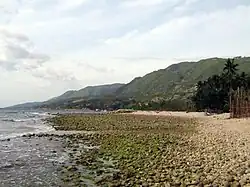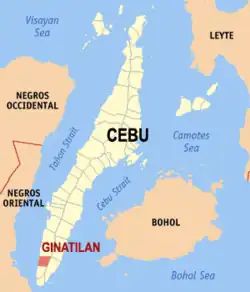Ginatilan | |
|---|---|
| Municipality of Ginatilan | |
 Coastal view | |
 Map of Cebu with Ginatilan highlighted | |
OpenStreetMap | |
.svg.png.webp) Ginatilan Location within the Philippines | |
| Coordinates: 9°36′N 123°21′E / 9.6°N 123.35°E | |
| Country | Philippines |
| Region | Central Visayas |
| Province | Cebu |
| District | 7th district |
| Founded | 1847 |
| Barangays | 14 (see Barangays) |
| Government | |
| • Type | Sangguniang Bayan |
| • Mayor | Roy Vincent P. Singco |
| • Vice Mayor | Dean Michael P. Singco |
| • Representative | Peter John D. Calderon |
| • Municipal Council | Members |
| • Electorate | 13,172 voters (2022) |
| Area | |
| • Total | 70.10 km2 (27.07 sq mi) |
| Elevation | 174 m (571 ft) |
| Highest elevation | 766 m (2,513 ft) |
| Lowest elevation | 0 m (0 ft) |
| Population (2020 census)[3] | |
| • Total | 16,906 |
| • Density | 240/km2 (620/sq mi) |
| • Households | 3,974 |
| Economy | |
| • Income class | 5th municipal income class |
| • Poverty incidence | 19.80 |
| • Revenue | ₱ 84.58 million (2020) |
| • Assets | ₱ 265.4 million (2020) |
| • Expenditure | ₱ 90.16 million (2020) |
| • Liabilities | ₱ 75.94 million (2020) |
| Service provider | |
| • Electricity | Cebu 1 Electric Cooperative (CEBECO 1) |
| Time zone | UTC+8 (PST) |
| ZIP code | 6026 |
| PSGC | |
| IDD : area code | +63 (0)32 |
| Native languages | Cebuano Tagalog |
Ginatilan, officially the Municipality of Ginatilan (Cebuano: Lungsod sa Ginatilan; Tagalog: Bayan ng Ginatilan), is a 5th class municipality in the province of Cebu, Philippines. According to the 2020 census, it has a population of 16,906 people.[3]
Ginatilan is one of the eight municipalities comprising the 7th Congressional District Cebu Province. It is 148 kilometres (92 mi) from Cebu City.
Geography
Ginatilan is bordered to the north by the town of Malabuyoc, to the west is the Tañon Strait, to the east is the town of Oslob, and to the south is the town of Samboan.
Barangays
Ginatilan is politically subdivided into 14 barangays. Each barangay consists of puroks and some have sitios.
| PSGC | Barangay | Population | ±% p.a. | |||
|---|---|---|---|---|---|---|
| 2020[3] | 2010[5] | |||||
| 072225001 | Anao | 3.6% | 616 | 534 | 1.44% | |
| 072225002 | Cagsing | 6.9% | 1,171 | 1,162 | 0.08% | |
| 072225003 | Calabawan | 3.9% | 654 | 538 | 1.97% | |
| 072225004 | Cambagte | 2.8% | 472 | 577 | −1.99% | |
| 072225005 | Campisong | 2.7% | 457 | 459 | −0.04% | |
| 072225006 | Cañorong | 4.7% | 792 | 819 | −0.33% | |
| 072225007 | Guiwanon | 7.1% | 1,205 | 968 | 2.21% | |
| 072225008 | Looc | 6.9% | 1,172 | 1,050 | 1.11% | |
| 072225009 | Malatbo | 5.8% | 986 | 815 | 1.92% | |
| 072225010 | Mangaco | 8.2% | 1,390 | 1,218 | 1.33% | |
| 072225011 | Palanas | 14.7% | 2,490 | 1,970 | 2.37% | |
| 072225012 | Poblacion | 19.0% | 3,219 | 3,045 | 0.56% | |
| 072225013 | Salamanca | 4.3% | 719 | 640 | 1.17% | |
| 072225014 | San Roque | 9.2% | 1,563 | 1,532 | 0.20% | |
| Total | 16,906 | 15,327 | 0.99% | |||
Climate
| Climate data for Ginatilan, Cebu | |||||||||||||
|---|---|---|---|---|---|---|---|---|---|---|---|---|---|
| Month | Jan | Feb | Mar | Apr | May | Jun | Jul | Aug | Sep | Oct | Nov | Dec | Year |
| Mean daily maximum °C (°F) | 29 (84) |
29 (84) |
30 (86) |
32 (90) |
31 (88) |
30 (86) |
30 (86) |
30 (86) |
30 (86) |
29 (84) |
29 (84) |
29 (84) |
30 (86) |
| Mean daily minimum °C (°F) | 23 (73) |
23 (73) |
23 (73) |
24 (75) |
25 (77) |
25 (77) |
24 (75) |
24 (75) |
24 (75) |
24 (75) |
24 (75) |
23 (73) |
24 (75) |
| Average precipitation mm (inches) | 35 (1.4) |
28 (1.1) |
38 (1.5) |
51 (2.0) |
125 (4.9) |
195 (7.7) |
194 (7.6) |
173 (6.8) |
180 (7.1) |
192 (7.6) |
121 (4.8) |
64 (2.5) |
1,396 (55) |
| Average rainy days | 9.2 | 8.2 | 9.9 | 11.3 | 22.5 | 27.3 | 28.0 | 27.2 | 27.1 | 26.9 | 19.7 | 12.7 | 230 |
| Source: Meteoblue[6] | |||||||||||||
Demographics
| Year | Pop. | ±% p.a. |
|---|---|---|
| 1903 | 10,617 | — |
| 1918 | 11,989 | +0.81% |
| 1939 | 8,690 | −1.52% |
| 1948 | 8,390 | −0.39% |
| 1960 | 8,150 | −0.24% |
| 1970 | 9,036 | +1.04% |
| 1975 | 10,055 | +2.17% |
| 1980 | 10,566 | +1.00% |
| 1990 | 11,160 | +0.55% |
| 1995 | 11,924 | +1.25% |
| 2000 | 14,073 | +3.62% |
| 2007 | 13,654 | −0.42% |
| 2010 | 15,327 | +4.30% |
| 2015 | 15,919 | +0.72% |
| 2020 | 16,906 | +1.19% |
| Source: Philippine Statistics Authority[7][5][8][9] | ||
Economy
Attractions
Inambakan Falls is the municipality's most visited natural attraction.[17] Hidden in a river valley in the middle of Ginatilan's highlands, the towering 100-foot (30 m) waterfall can be reached via motorcycles for hire.
Mount Hambubuyog straddles the border of Ginatilan and Samboan.[18] The summit offers views of Tañon Strait and Negros Island.
Local delicacies include palagsing, tinumpi, and kinugay, made from buli tree.
Every March is annual festival in honor of the patron St. Gregory the Great.
Livelihood includes farming, fishing, government, and business.
Ginatilan is the hometown of Catholic martyr and second Filipino saint, St. Pedro Calungsod, who was killed during his missionary work in Guam with Diego Luis de San Vitores in 1672.
Education
The public schools in the town of Ginatilan are administered by one school district under the Schools Division of Cebu Province.
Elementary schools:
- Anao Elementary School — Anao
- Cambagte Elementary School — Cambagte
- Campisong Elementary School — Campisong
- Canorong Elementary School — Cañorong
- Guiwanon Elementary School — Looc
- Kabatuan Elementary School — Caseres Road, Poblacion
- Kagsing Elementary School — Cagsing
- Salamanca Elementary School — Salamanca
High schools:
- Guiwanon National High School — Guiwanon
- Salamanca National High School — Salamanca
Integrated schools:
- Ginatilan Integrated School (formerly Ginatilan CES) — San Roque
- Mangaco Integrated School — Mangaco
- Palanas Integrated School — Palanas
Private schools:
- Holy Trinity School of Ginatilan, Inc. — San Roque
References
- ↑ Municipality of Ginatilan | (DILG)
- ↑ "2015 Census of Population, Report No. 3 – Population, Land Area, and Population Density" (PDF). Philippine Statistics Authority. Quezon City, Philippines. August 2016. ISSN 0117-1453. Archived (PDF) from the original on May 25, 2021. Retrieved July 16, 2021.
- 1 2 3 Census of Population (2020). "Region VII (Central Visayas)". Total Population by Province, City, Municipality and Barangay. Philippine Statistics Authority. Retrieved 8 July 2021.
- ↑ "PSA Releases the 2018 Municipal and City Level Poverty Estimates". Philippine Statistics Authority. 15 December 2021. Retrieved 22 January 2022.
- 1 2 Census of Population and Housing (2010). "Region VII (Central Visayas)" (PDF). Total Population by Province, City, Municipality and Barangay. National Statistics Office. Retrieved 29 June 2016.
- ↑ "Ginatilan: Average Temperatures and Rainfall". Meteoblue. Retrieved 10 May 2020.
- ↑ Census of Population (2015). "Region VII (Central Visayas)". Total Population by Province, City, Municipality and Barangay. Philippine Statistics Authority. Retrieved 20 June 2016.
- ↑ Censuses of Population (1903–2007). "Region VII (Central Visayas)". Table 1. Population Enumerated in Various Censuses by Province/Highly Urbanized City: 1903 to 2007. National Statistics Office.
{{cite encyclopedia}}: CS1 maint: numeric names: authors list (link) - ↑ "Province of Cebu". Municipality Population Data. Local Water Utilities Administration Research Division. Retrieved 17 December 2016.
- ↑ "Poverty incidence (PI):". Philippine Statistics Authority. Retrieved December 28, 2020.
- ↑ "Estimation of Local Poverty in the Philippines" (PDF). Philippine Statistics Authority. 29 November 2005.
- ↑ "2003 City and Municipal Level Poverty Estimates" (PDF). Philippine Statistics Authority. 23 March 2009.
- ↑ "City and Municipal Level Poverty Estimates; 2006 and 2009" (PDF). Philippine Statistics Authority. 3 August 2012.
- ↑ "2012 Municipal and City Level Poverty Estimates" (PDF). Philippine Statistics Authority. 31 May 2016.
- ↑ "Municipal and City Level Small Area Poverty Estimates; 2009, 2012 and 2015". Philippine Statistics Authority. 10 July 2019.
- ↑ "PSA Releases the 2018 Municipal and City Level Poverty Estimates". Philippine Statistics Authority. 15 December 2021. Retrieved 22 January 2022.
- ↑ sparksph (2022-06-02). "Exploring the Breathtaking Beauty of Inambakan Falls". Suroy.ph. Retrieved 2022-07-20.
- ↑ Mount Hambubuyog